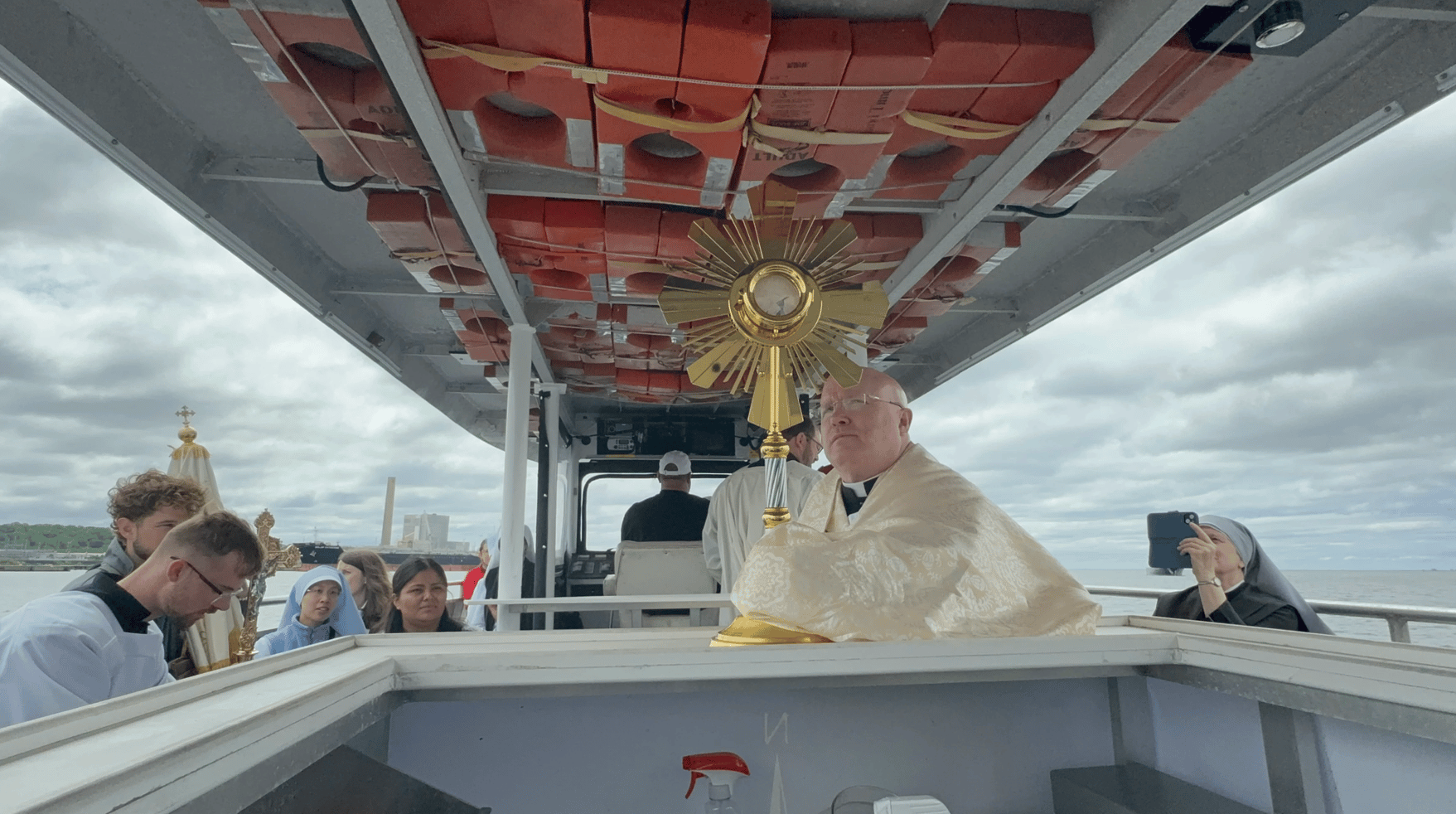NEW YORK – When the National Eucharistic Pilgrimage passed through the Bronx borough of New York City last week, Father Roger Landry witnessed what he describes as the heroic efforts of an older woman, who insisted on getting out of her wheelchair to kneel before Jesus.
“It was already an effort just to come out and greet him, but that type of heroism, it was a part of the conversation I had with Jesus for the next 10 minutes as I was holding him in my hand,” Landry said.
Landry is the chaplain for the St. Elizabeth Ann Seton Route – the eastern arm of the pilgrimage from New Haven, Connecticut, to Indianapolis, Indiana. His duties include carrying the monstrance for long stretches, celebrating Mass, and hearing confession – what he described as carrying out “typical priestly priorities in an ambulatory way.”
Landry spoke to Crux on May 29 about the pilgrimage so far.
From a micro perspective, Landry said he has been moved by people like the older woman and others in wheelchairs who have come out to support, and even join, in the pilgrimage when it passes by. He also said he was moved on multiple occasions to see people stop their vehicles – bringing traffic to a standstill – to get out and kneel on the asphalt until the Blessed Sacrament passes.
From a more macro perspective, Landry highlighted that the gratitude people have for the pilgrimage is “palpable,” as is the enthusiasm they exhibit. For example, he said late on May 28 when they arrived at the cathedral of the Diocese of Trenton, New Jersey, it was packed to its capacity of 1,000 people, and there were more than 200 people on the steps outside to greet them, all singing and cheering.
“Those types of welcomes to Jesus have given me a new understanding of what Psalm Sunday would have been like because people are coming on out to meet the same Jesus who just looks different,” Landry said. “Not riding a donkey, but being carried by a priest who has been called various synonyms for donkey over his life.”
“And just to be able to behold it, and experience it, and not just once over 65 days, but honestly several times a day reinforces that I am the luckiest priest in America being able to experience all 65 days because I really am seeing first-hand the gratitude that people have for the Lord Jesus in the Holy Eucharist, and the love that they have back for the love that he gives.”
At the time of publication Landry and the six perpetual pilgrims on the Seton Route will be on their last day in New Jersey and on their way to Pennsylvania and the Archdiocese of Philadelphia. They’ve already traveled through Connecticut and New York. The Seton Route totals about 1,500 miles.
As the pilgrimage’s chaplain, Landry is in his vestments the entire time, which he is “still getting used to.” He said bought a new summer cassock for the pilgrimage that breathes a little more easily than his usual one. Over it he wears a white surplice and then a stole.
When he’s carrying the Blessed Sacrament a humeral veil goes over his shoulders.
“While I am carrying him I do feel palpably that he’s carrying me,” Landry said.
Landry also has a unique perspective on the pilgrimage, as a catalyst for its creation. Landry’s original idea was a pilgrimage to the National Eucharistic Congress along the circumference of the country – from the missions in California all the way along the south up to St. Patrick’s Cathedral in New York, to Indianapolis, and then a northern route back.
It was originally viewed as impractical, but after more priests who were involved in the National Eucharistic Revival as National Eucharistic Preachers pushed for it, Bishop Andrew Cozzens of Crookston, chair of the National Eucharistic Congress got on board, as well, and eventually the pilgrimage plan was shifted into its current form of four separate routes to Indianapolis from the four cardinal points in the United States, which Landry said was a “brilliant idea.”
Landry, a priest of the Diocese of Fall River, Massachusetts, is the chaplain of Columbia University. With his summers more or less off, it was easy for him to commit to the full 65-day pilgrimage.
Landy said it’s remarkable how it turned out.
“This is historic,” Landry said. “That you would have something that is totally national, especially in a country the size of a continent like the United States has never even been dared and the U.S. Bishops and the U.S. church are actually doing that right now. To be a part of something that audacious is something that I think is making the saints I hope to meet one day when my earthly pilgrimage is over jealous.”
Landry has also created a blog to document everyday of their journey – setonpilgrimage.org – which he said provided Catholics the opportunity to participate in the entire pilgrimage.
“They might be able to share a day with us if one of the four routes is passing close by to where they are, but my hope is that many will participate spiritually in the pilgrimage, but the only way that’s going to happen is if they have a chance to live the route,” Landry said.
Follow John Lavenburg on X: @johnlavenburg














